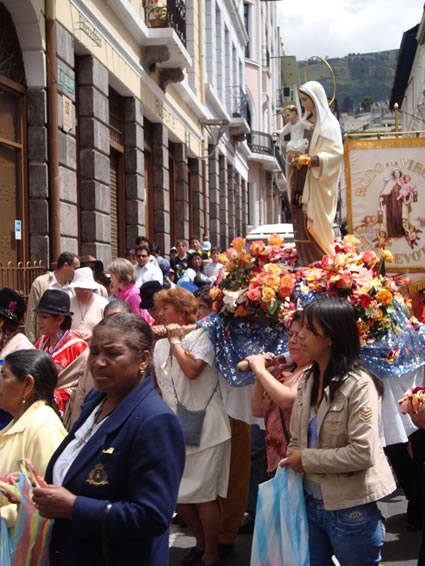 |
| Street parade in Quito. |
Welcome to Ecuador
“It’s part of Ecuadorian culture,” Jois said. “Get in there.”
Jois was my Spanish teacher and “in there” was a massive rectangular corral where an angry bull chased around two drunken clowns who had just held the bull down and poured beer into its mouth. She sat with her hand resting on a pregnant hump of belly, fanning away the heat with a piece of cardboard. We watched the spectacle below from bleachers built of decaying scrap wood tied together with bandanas. They creaked and swayed as people crawled up and children yanked at the side planks.
It was my final week in Quito after nearly two months of intense Spanish tutoring. Four hours a day, every day, one-on-one with Jois. We had spent so much time together we had become siblings.
“What will you do if I’m gored?” I asked her.
She rolled her eyes. “Por Dios, my little brother is out there.”
I turned around. Sure enough, there he was. The little 12-year-old hovered near the fence and then darted across the corral in front of the bull. The bull’s eye caught him and he gave chase, his hooves flinging wildly about his sides as he galloped. The boy swerved and leaped to the fence just as the bull swept under his heels. Jois raised her eyebrows and smiled.
I jumped down and joined a band of men inside the corral. We boldly approached the bull holding hands. The bull shifted his horns and we scattered like frightened schoolgirls over the fence. After a few such displays we celebrated our bravery safely outside of the corral. After my intense language immersion I could finally speak and laugh with them.
“Give the gringito some beer!” one of them said.
A man poured a warm foamy stream of Pilsner into my mouth. As it gurgled down I felt proud to be melting into their culture. Only in Latin America can something like this happen.
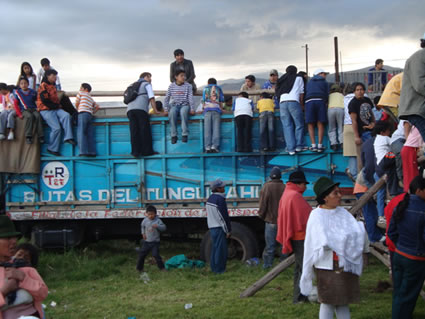 |
| Waiting for a bullfight outside of Quito. |
Finding a Spanish School
My travels in South America began in Bolivia. I had no itinerary but knew at some point I would need to enroll in a Spanish school before I returned to my University in the fall. I needed to be fluent for the following spring, when I would be attending a University in Chile.
I quickly discovered that all the information I needed could be easily attained by striking up a conversation with anyone with a heavy backpack. This is the stream of travel culture that anyone who has been on the road knows. If there is a golden rule for travel in foreign countries; it is to always wear a smile and talk to everyone. In South America Israelis seemed to be gold mines of information. There is a dense network of them throughout the entire continent, and they all seem connected to a massive sea of information hovering above everyone else’s head.
“You want school, what school?”
“A Spanish school.”
“To learn language?”
“Yeah.”
A group of them would gather and discuss the problem in Hebrew.
“Okay, you go to Quito. Very cheap and good and the instructor girls will fall in love with you. They say the best might be in Colombia but it is not so cheap. You go to Quito yeah?”
After hearing this advice from numerous sources I had my mind laid out. After a brief journey through the mountains of Peru I hopped on a bus to Quito to begin the study portion of my trip.
In Quito, as in every other Latin American city, the best way to find a Spanish school is to check the message boards at the hostels, or to ask the staff. Finding the major hostels is fairly easy: simply search websites such as www.hostelworld.com or www.hostelbookers.com. Using these websites is also useful to the traveler whose schedule changes often and who does not wish to book in advance. You can go onto the websites and research average prices before arriving in a city to ensure that you get a fair price. Knowing the average price also gives you bargaining leverage if you end up in a hotel during low season and the tenants are flexible.
The hostels often have business relationships with the Spanish schools and will be eager to point you in the right direction. Spanish classes cost between four and ten dollars an hour, depending on how long you plan to study and the reputability of the school. Many of the newer or smaller schools have significantly discounted prices because they do not yet have the reputation of the larger schools. Many will offer extra incentives, such as cultural tours, salsa lessons, or even offer classes at jungle lodges in the Ecuadorian rain forest. Schools include: Colonial Spanish School and The Quito Spanish Institute. Quito is a terrific place to learn because almost nobody speaks English.
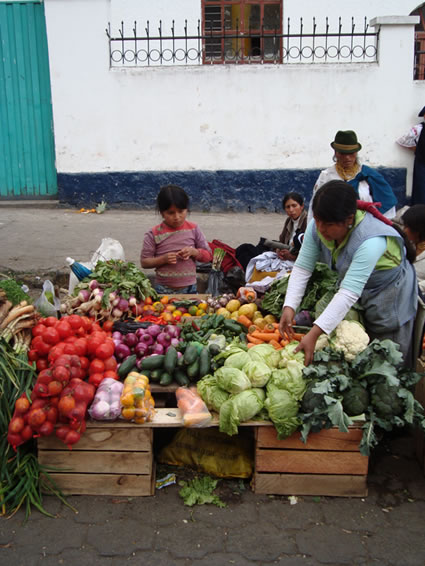 |
| Street vendor in Quito. |
Working and Volunteering
The bolder the traveler the more inventive his or her source of income will be. Most seek internship programs or teach English—both excellent options in Ecuador. The language schools seem to always be looking for native English speakers and it is not too difficult to get a job, although you might not get rich from the pay. The more qualified you are the more your income and job security will be, but often native speaker status is enough to get you hired. At my Spanish school the coordinator offered free Spanish classes in exchange for teaching English classes. When I said no he offered to pay me. Every week new notices were posted at the hostel message boards looking for English teachers and private tutors.
If you are looking for a more exciting way to acquire income, be imaginative. The most telling examples came from travelers I have met on the road. One guy from New York took two weeks of salsa lessons and then became a salsa teacher himself at one of the salsa schools. They hired him because he could give lessons to the English-speaking customers. As long as he remained one step ahead of his pupils he made a great teacher. I met an Australian girl who was having the time of her life sailing from Cartagena to Panama City and back just about every week, and getting paid for it. The captains needed tourists to fill their boats and therefore needed English speakers to go to the hostels in order to recruit them. She filled a well-defined need and made good money doing so.
I chose an alternate route. I met an intern for Viva Travel Guides in a bar in Quito. He told me the company was always looking for writers to do freelance work for their website. The offices are based in Quito, so I set up an interview with the editor. I gave her some travel articles I had written for a school newspaper and told her which locations I could cover for her. She gave made the job. The point is to be creative and be aware of one of your most valuable assets: your ability to speak English.
If earning money is not a priority you may think about volunteer work to help pass the time or to extend the length of your travel. Volunteer opportunities in Ecuador are diverse and substantial. From working with wildlife conservation on the Galápagos Islands to teaching English in the Amazon, the opportunities are vast. Programs include: Global Vision International, www.ecuadorvolunteer.org, and The Global Volunteer Network.
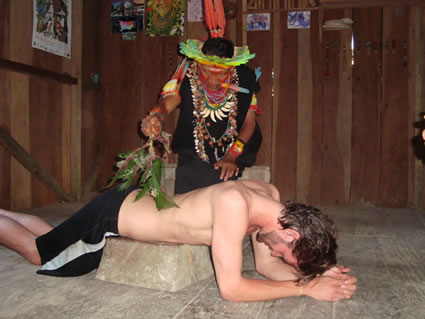 |
| Shaman in Ecuadorian Amazon. |
Finding a Place to Live
By the time I reached Quito I had been backpacking South America for two months, but life in this city still astonished me. I arrived at two in the morning and left the bus station on foot to begin exploring. A band of mangy strays followed behind me and before I left the reach of the station lights a cab driver waved me down and told me I was guaranteed to be robbed if I walked from the station at night. He took me to a nearby hotel and I banged on the door until the sleepy tenant appeared. I tried to bargain a room but he was too tired and angry that I had awaken him to budge on the price. He led me through the stairwells with a lantern and showed me a cold little room on the roof, whose thin doors shuttered when the wind blew.
The next morning I went searching for a residence and found a cheap hotel in the old colonial center for four dollars a night on the condition that I stayed more than a month. It had a large bed and a balcony overlooking the bustling streets where schoolboys played soccer every night on the cobblestones.
If you are staying in Quito I suggest living in Old Town, where the buildings are beautiful and you wake every morning to heavy cathedral bells and the bullhorn wailings of the fruit vendors. Most foreigners stay in New Town—in the Mariscal district—which does not quite have the ambience of the colonial center. It has more amenities and is closer to the action but also has a much higher crime rate because of the amount of foreigners that do stay there.
Saving Money in Ecuador
One thing Americans will love about Ecuador is that they do not have to exchange money because Ecuadorians use Unites States currency. Another thing to love is that Ecuador is very cheap. This was convenient because I was very poor. Most people, even on the most frugal of budgets, will get along just fine. I was on a budget of 15 dollars a day, and that was without subtracting money for my Spanish School and hotel. So I came up with interesting ways to save money.
The first rule of budgeting in Ecuador is to always bargain. No price is ever set. To get a cheap cab thumb one down and tell him your destination and ask a price. Half that price and if he won’t do it thumb down another cab. If they won’t do it, thumb down another, steadily increasing the price from the original half until someone accepts.
For food, eat the set meals. They are always generous portions and always include soup beforehand and usually come with a drink. They cost around $1.50 and with a little searching about you will find the most popular places. The Chinese restaurants are another good choice for cheap good food, but be careful and only order half plates. The full plates are usually enough for an entire family.
If you like to cook go to the open air markets and bargain fresh produce and meat from the colorfully dressed indigenous folk. Set breakfasts are rarely satisfying, so swing by the panaderías for freshly baked pastries. I personally prefer cornflakes, which I found easy to carry even when traveling. I carried a plastic bowl and a bag of powdered milk along with me. I cleaned the bowl each morning with hand soap, mixed the powdered milk with water and had an American breakfast wherever I went.
You can almost always bargain for you accommodations. Never accept the first offer and have a look around before deciding on any particular place. Always ensure that the water is hot if they advertise hot water and, if you are uncomfortable in dirty rooms, ask to have a look at the bed before you commit to anything.
Traveling in Ecuador is cheap and relatively easy. Prices run around a dollar for each hour of travel, and some companies offer snacks and juice drinks for rides over seven hours. Most distances in Ecuador can be covered in less than eight hours, and there is no need to worry about food or drinks. Every time the bus slows down a band of street merchants will run alongside and hop on the bus to sell you anything imaginable, from cold coca-cola to hot chicken to traveling toothbrushes and "miracle" medicines. Most long distance buses have regular bathroom breaks if there is no bathroom on board (which there usually is not) as well as meal stops at restaurants where you can get typical Ecuadorian fair. You can catch a bus at the station, or by standing along the road that runs to your destination and flagging one down. Destinations are always posted on the front windshield and drivers will stop if the bus is not already full. In fact they will stop regardless of whether they are full, so you may have to be prepared for a standing journey if you plan to travel this way. Also do not expect buses to be on time. Nothing in Ecuador is ever on time.
Getting your clothes washed is easy and cheap enough. Lavanderías are scattered everywhere and most hotels and hostels have a laundry service. Due to my low budget I invested in a bucket and bought laundry soap from the supermarket. I filled the bucket with hot water from the shower and hand-washed my clothes, stringing them to dry on the rope I strung across the rooftop of my hotel.
Cheap sweet fruity wines are popular among Quiteños, but good wine only comes imported and can eat away at your dollars. Beer, however, is cheap and good, usually coming about a dollar a pint if you buy on the street. You can save even more money by returning the bottles for credit.
Quito has a spectacular nightlife to suit every taste. In the Mariscal district of New Town you can find flashy salsa clubs, grungy rockero bars, or lively gringo haunts where only English is spoken and cheap drinks are served to accommodate backpacker budgets.
If you are not carrying a cell phone this is no big deal. Nearly everywhere you go you will find someone with a little sign advertising phone calls. They will lend you a cell phone and charge you a cheap rate on the call you make. The Internet is widely available.
Visa requirements are simple for Ecuador and can be attained for free at the airport or any border crossing.
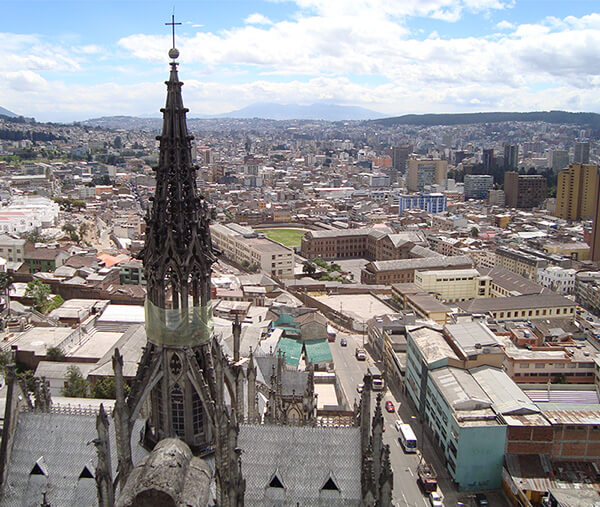 |
| Quito from above |
Words of Advice
Whatever happens, do not panic. Traveling in South America is full of rich surprises. Something will inevitably happen everyday to startle you. As long as you have a tranquil air about you things will be fine. Having traveling insurance is a wise decision. Companies like STA Travel provide affordable and extensive plans for students.
Robbery is a very real danger, especially when traveling alone in many parts of South America. I have been robbed numerous times, even at gunpoint. Once again, the key is to not panic. It is a good idea to carry a hidden pouch on you with your most essential possessions, as well as a decoy wallet in case you do get robbed. A decoy wallet should have an old, deactivated credit card and a little bit of cash. Never fight off a robber or resist. This will usually result in a physical attack. The robber should be appeased by your decoy wallet and may not harm you as long as you comply with his wishes.
The best advice I can give to any traveler is to become involved in organizations like www.couchsurfing.com or www.hospitalityclub.org. These are world-wide networks of travelers that offer free accommodation to one another, as well as organize events and gatherings. I have “couchsurfed” over 80 times in more than 20 countries and have yet to have a bad experience. I have been met with nearly mythical hospitality from every one of my hosts and have gained access to cultures that would have been impossible in any other way.
Unfortunately any traveler is inherently relegated to an outsider’s prospective. When you stay in the home of someone who was born and raised in the place you are visiting, however, an entirely new world is revealed to you. These experiences have helped me gain a deeper and more meaningful understanding of the places I have visited. All of the questions you have about the idiosyncrasies of a culture suddenly have someone qualified to answer them. You find yourself surrounded by locals rather than other travelers, and meet people who seem to have crawled out of well-written novels.
The networks also serve as cure for the loneliness that overwhelm so many travelers. These networks instantly give you friends in nearly every nation in the world.
The message boards are a great way to find traveling companions for weekend sojourns or even extended trips. They also are unequaled for information gathering. Using message boards, almost any questions you may have about a location can be answered by the locals themselves and questions you have about traveling in general—whether regarding what to pack or how to find a job—can also be answered
No comments:
Post a Comment